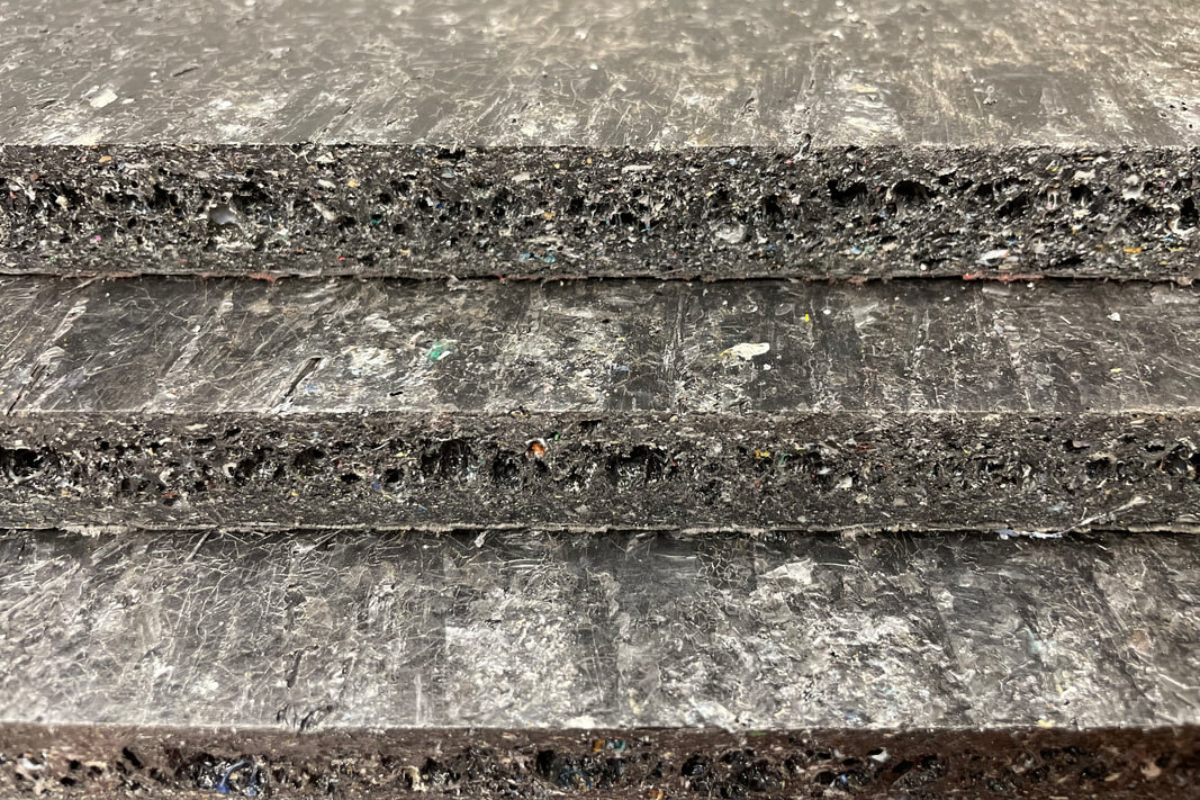
The Mamba Board line features composite boards made from recycled e-plastics. | Courtesy of RePolyTex
E-plastics processor Synergy Electronics Recycling and its subsidiary, RePolyTex, have expanded their product line of composite boards made with recycled e-plastics and recently earned recognition from the Carolina Recycling Association.
Both companies are based in Madison, North Carolina, with Synergy processing electronics into various material streams and sending the plastics to RePolyTex to make into 4-by-8 boards of various strengths and uses.
Dubbed Mamba Board, the product line has grown from the original, 100% recycled board to include three more products over the past several months that feature external fiberglass reinforcement and other adjustments, said Megan Tabb, director of compliance at RePolyTex. Their applications include specialty vehicles like trailers and boats as well as other outdoor and marine structures.
“The core board is the same,” RePolyTex Chief Technology Officer Lee Clayton said. “What we’ve found is not one size fits all.”
Synergy and RePolyTex take an uncommon approach to plastic composite boards: Rather than rigorously separating, extruding or pelletizing the different resins contained in electronic devices, they use recipes and processes adapted to the entire mixture.
The proportion of those polymers among all devices stays fairly constant, Clayton said. Even as OEMs’ products are “rapidly changing,” in practice that just means more plastic in a given item, he added. As a result, a pound of inbound plastic creates a pound of product, with boards that are more rigid, durable and thermally stable than more widespread types of recycled-plastic lumber.
“It’s all about the yield,” Clayton said, quipping that he’ll have the phrase on his gravestone. “We use the strengths of the polymers we’ve got.”
The companies in March were among several recipients of the Annual CRA Awards, which honor “top performers that advance waste reduction and recycling in the Carolinas,” according to the association’s website.
“By eliminating the energy-intensive separation processes, their approach significantly reduces the carbon footprint associated with plastic recycling,” the association wrote. “Furthermore, the production of the Mamba boards requires less energy compared to manufacturing traditional materials, further minimizing their environmental impact.”
Synergy has revamped its facilities and increased throughput in recent years and is now producing around 500,000 pounds of plastic per month, Tabb said. RePolyTex, meanwhile, can consume about twice that amount, which is supplemented with other domestic sources, including post-industrial scrap plastic from OEMs. And it could quickly scale up to twice that amount again, depending on growing demand, Clayton said.
Tabb noted that the most recent products on the Mamba Board line, engineered for better adhesion with epoxies and other improvements, stemmed from customers suggesting new ways they could use the boards.
“We feel that we’re almost a solution provider,” Clayton said, adding he’s particularly proud of his company’s exclusively domestic material streams. “If you give us a challenge, we’ll go ahead and try to meet that challenge.”